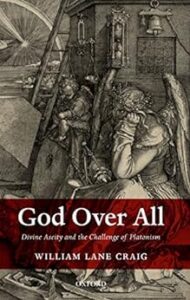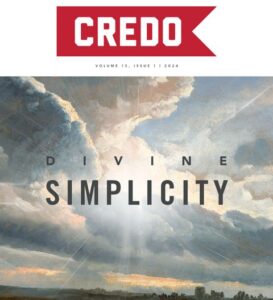W illiam Lane Craig is arguably the most well-known living evangelical philosopher and apologist. He has written on both the scholarly and popular levels on topics such as the divine attributes, arguments for God’s existence, the historical Adam, the resurrection of Jesus, and the philosophy of time. He has debated numerous leading atheists, Muslims, scientists, philosophers, and theologians on a range of issues and has demonstrated time and again his ability to articulate his Christian convictions and the superiority of the Christian worldview.
illiam Lane Craig is arguably the most well-known living evangelical philosopher and apologist. He has written on both the scholarly and popular levels on topics such as the divine attributes, arguments for God’s existence, the historical Adam, the resurrection of Jesus, and the philosophy of time. He has debated numerous leading atheists, Muslims, scientists, philosophers, and theologians on a range of issues and has demonstrated time and again his ability to articulate his Christian convictions and the superiority of the Christian worldview.
Outline Of Craig’s Book
In God Over All: Divine Aseity and the Challenge of Platonism, a semi-popular version of his book God and Abstract Objects, Craig raises an important issue in Christian theology and philosophy. In fact, it is an issue that Craig himself states he wrestled through in his own mind and has called it one of the most devastating arguments against Christian theism.[1] The issue concerns God’s relationship to abstract objects, especially things like numbers but including ideas like wisdom, goodness, power, redness, blueness, triangles, etc. Plato held that material things participate in eternal forms which exist in some third realm. These forms are neither created by God, nor are they controlled by Him. Instead, God created the world after their pattern.[2]
Craig, however, raises the question – if there are eternal, uncreated, abstract objects that God Himself neither creates nor controls, how is God’s aseity to be maintained? If 2+2=4 and these numbers exist independently of God and could not have been otherwise, how are they themselves not semi-divine and how is God the ultimate reality upon which all that is not God depends, to say nothing of other such properties as love, goodness, justice, knowledge, or power. As Craig writes, “Insofar as these abstract objects are taken to be uncreated, necessary, and eternal, contemporary Platonism also comes into conflict with the traditional doctrines of divine aseity and creation.”[3] Christians have always maintained that God is the ultimate reality in that He depends upon nothing and all things that are not God are created realities which depend upon Him. But the existence of these eternal, uncreated, abstract objects appears to pose a direct conflict with such a theological commitment.
Craig begins his response to the challenge of Platonism in chapter one by defining three essential views. The first, realism, holds that things like numbers really exist as eternal abstract objects. The second, arealism, holds that the question itself is meaningless. Third, anti-realism, the view that Craig wishes to posit in this book, treats such objects as useful concepts (really, nominal notions) that have no ontological existence in themselves. Thus, things like the number 2 do not actually exist in the heavy sense of existing but only exist in particular things. This type of view has often been tied to variations of nominalism, a term which Craig wishes to avoid for clarity’s sake. God is pure act (actuality) and exists without parts, potential, change, or division. As others have stated, all that is in God is God. Click To Tweet
In chapter two, Craig makes a biblical and historical case for divine aseity. Scripture is clear that God is the creator of all that is not God. For example, in 1 Corinthians 8:6, the Apostle Paul states, “Yet for us there is but one God, the Father, from whom are all things and we exist for Him; and one Lord, Jesus Christ, by whom are all things, and we exist through Him.”[4] God created all things not God and, as the Church Fathers taught, exists alone as agenetos (uncreated). Therefore, God alone exists a se and everything else depends upon Him for existence.
In chapter three, Craig lays out the target of his critique: the Indispensability Argument (hereafter “IA”) for realism. This argument begins with the premise that “If a simple sentence is literally true, then the objects that its singular terms denote exist.” Second, “there are literally true simple sentences containing singular terms that refer to things that could only be abstract objects.” Therefore, third, “abstract objects exist.”[5] This argument, when applied to mathematics, amounts to an argument that, if we hold scientific theories based in mathematics to be successful and really applicable to the world, then the mathematics upon which they are built must be real. But these mathematical foundations assume the reality of numbers. Therefore, eternal abstract objects such as numbers are real. It would seem then, on a Platonist understanding, that that numbers pose a challenge for the aseity of God if they are eternal, uncreated, abstract objects. Of course, created abstract objects, such as a song that begins to exist and would exist independently of being written down, pose no threat. But eternal abstract objects, if uncreated, do not depend upon a creator. How, then, are Christians to avoid the challenge of Platonism concerning things like numbers?
In the remainder of the book, Craig presents several views on how one can avoid the problem posed by the existence of these numbers and other abstract objects. He begins by presenting two realist models: absolute creationism and divine conceptualism. In absolute creationism (chapter four), God does create these eternal properties and numbers, but Craig argues that such models, among other things, lead to the so-called “bootstrapping problem” in which God creates the very properties that define Him.
In divine conceptualism (chapter five), abstract objects like numbers are real and yet exist in the mind of God as His thoughts. Craig acknowledges that this has been the majority view in church history, even acknowledging it as his own fallback position. He, however, rejects such a view on the basis that, in his view, if God’s thoughts are caused, then God is thinking the things necessary for Him to think (the bootstrapping problem), but if they are uncaused, then one is back to positing uncaused abstract concepts that exist independently of God, objects which He knows, but does not cause. Further, if God’s thinking is what gives things their reality, then God knowing about a counterfactual makes it exist in some sense, including all kinds of evil, which God must be eternally thinking.
Chapters six and seven present reasons to reject ontological commitments for both quantifiers and terms in the IA. These chapters are the most technical of the book. In them, Craig argues that both initial premises of the IA are plausibly denied and that the applicability of mathematical objects, for example, could be simply descriptive concepts of the way the physical world works as made by God, rather than self-existing entities. Or, for example, consider a color. One can give a materialistic description of why a concrete object is red without having to posit a universal or eternal “redness.” Therefore, Craig concludes, the IA is a poor argument for realism and should make one consider rejecting realism altogether.
In light of these problems, and a few others, Craig argues that the theist should seek to avail himself of anti-realist views. Craig proposes three such views, namely, fictionalism (numbers and other abstract objects are useful, but imaginary concepts), figuralism (numbers and other abstract objects are not meant to be taken literally), and pretense theory (using numbers and other abstract objects does not commit one to their existence or non-existence). In each of these theories, to various extents, numbers and other abstract objects are seen as useful ideas within given paradigms but nothing more. These ideas, though technically distinct, have significant overlap and often blur the lines of distinction, as Craig acknowledges.[6] However, he finds these options to be valuable in dissolving the conflict and in giving an account of the functionality of mathematics.
In the end, Craig himself espouses no particular theory but rather a hybrid of theories that utilize anti-realist understandings.[7] If these abstract objects do not exist apart from concrete particulars, and concrete particulars, with the exception of God, are not eternal, then such abstract objects do not exist in themselves and present no challenge to God’s independence or sovereignty. Therefore, as Craig says elsewhere, “the challenge to divine aseity simply evaporates or, rather, never appears.”[8]
A Simple Response
As one reads Craig’s work, three strengths in particular stand out. First, this book demonstrates not only Craig’s astounding grasp of the relevant literature but also his ability to communicate such concepts succinctly and clearly. Second, Craig’s concern for God’s aseity is spot on and he does an admirable job of presenting and defending it in chapter two. Third, Craig’s concern that absolute creationism leaves God as the creator of His own properties is an important point to make. While proponents may object that God’s causal relation is logical rather than temporal, this still separates such attributes from God and fails to give them adequate grounding. Because Craig dismisses divine simplicity, he misses the way it solves the problem of Platonist abstract objects and avoids the dangers of nominalism and radical volunteerism. Click To Tweet
There are, however, several weaknesses to Craig’s work that ought to be considered, not the least of which are Craig’s minimal anti-realist defenses or the problem of how, given the belief that numbers are figurative ideas and useful fictions, one can give an account of why they work so well. Further, how can one ever truly deny that “2+2=5” could be true in a different paradigm? Even many of the anti-realist proponents Craig cites admit this problem! However, since this issue of Credo is focused on divine simplicity, this review will focus on Craig’s dismissal of simplicity and the solution he overlooks as a result. Divine simplicity is the idea that God is identical with His divine nature such that there is no division between God and His attributes, existence, thoughts, or will or between the divine substance and the divine persons. Rather, God is pure act (actuality) and exists without parts, potential, change, or division. As others have stated, all that is in God is God.[9]
Craig presents divine simplicity under the heading of absolute creationism.[10] This in itself is problematic as, historically, divine simplicity was seen as a companion to divine conceptualism. Craig, however, dismisses the doctrine as incoherent and unviable, creating far more problems than it solves. In this particular work, Craig does not give an extended discussion about his reasons for thinking so but cites his book God and Abstract Objects. In that work, he lists the typical objections to the doctrine that many others have noted.[11] He points out that simplicity entails that God does not have distinct properties. Yet, properties like love and power seem so obviously distinct. Second, if God is identical to His properties, and His properties are identical, how is God Himself not simply a property, diminishing His personhood? Third, simplicity seems to imply that God cannot know or do differently than He has done without Himself being different than He is. Finally, if, per simplicity, God’s essence is His act of existing, how is God a personal being and not simply an action? For example, while Scripture says that God is love, how does simplicity not reverse this truth and say Love is god?
These objections and others have become standard in the literature and many theologians have taken on the challenge, successfully in this reviewer’s opinion.[12] However, because Craig dismisses this doctrine, he misses the way it solves the problem of Platonist abstract objects and avoids the dangers of nominalism and radical volunterism, the latter of which Craig himself wishes to avoid.[13]
As Craig acknowledges, divine conceptualism has been the majority view of God’s relationship to abstract objects throughout church history. For example, Augustine famously located Plato’s Forms, not in some third realm, but in God Himself,[14] in the case of divine attributes, and in God’s mind, in the case of external realities like numbers. Numbers are what they are because they exist in the mind of God.
Craig rejects this view, however, because, as previously noted, it falls into the trap of arguing that God’s thoughts, which comprise His omniscience, are caused things and therefore, God’s properties are caused. But historically, this wasn’t a problem for divine conceptualists like Augustine because they also held that God is simple and is identical with His act of thinking. While God’s thinking causes all that is not God, these thoughts do not compose God and are not created parts. As Aquinas argued, God is identical to His thinking and willing as these are nothing but the divine essence.[15]
However, while God is identical to His act of thinking and willing, He is emphatically not identical to the things He thinks or wills. This would be to accuse Christianity of equating God with numbers, triangles, or colors. So, while God is not identical with the number 2, God is identical with His act of thinking the number 2. According to a divine conceptualism grounded in divine simplicity, numbers are objective descriptions of reality because they are the eternal thoughts of the creator God about reality, but they do not exist as created parts of Him. They simply are the eternal essence thinking!
A simple God can give ontological grounding to abstract objects without giving them causal independence. Further, divine simplicity gives an answer to the problem of universals and particulars in holding that concrete, created particulars participate in pre-existent eternal forms that are not distinct from God, but are the eternal thoughts of God. Craig’s concerns about Platonism are serious challenges that need to be met, but, as this review suggests, these challenges are not to be met by denying that such things have real existence, but by locating their existence in the mind of a simple God.
Endnotes
[1] Craig, God Over All, 2
[2] Ibid.
[3] Craig, God Over All, 3.
[4] Scripture taken from the NEW AMERICAN STANDARD BIBLE, © Copyright the Lockman Foundation 1960,1962, 1963, 1968, 1971, 1972, 1973, 1975, 1977, 1988, 1995. Used by permission. Italics
[5] Craig, God Over All, 45-46.
[6] Craig, God Over All, 204.
[7] Ibid., 207
[8] Craig, God and Abstract Objects, x.
[9] James E. Dolezal, All That Is in God: Evangelical Theology and the Challenge of Classical Christian Theism (Grand Rapids, MI: Reformation Heritage Books, 2017), 41.
[11] William Lane Craig, God and Abstract Objects: The Coherence of Theism: Aseity (Cham, Switzerland: Springer International Publishing AG, 2017), 145–47.
[12] See, for example, James E. Dolezal, God without Parts: Divine Simplicity and the Metaphysics of God’s Absoluteness (Eugene, OR: Pickwick Publications, 2011) and Steven J. Duby, Divine Simplicity: A Dogmatic Account, T & T Clark Studies in Systematic Theology (New York, NY: T & T Clark, 2018).
[13] Craig, God Over All, 58.
[14] Augustine, Eighty-Three Different Questions, Fathers of the Church Patristic Series (Washington, D.C.: The Catholic University of America Press, 2010), 81.
[15] Thomas Aquinas, Summa Contra Gentiles, trans. Anton C. Pegis, vol. 1 (Notre Dame, IN: University of Notre Dame Press, 1975), 1.45 and 1.73.


